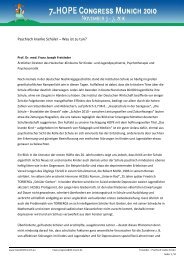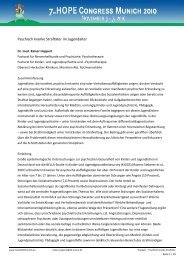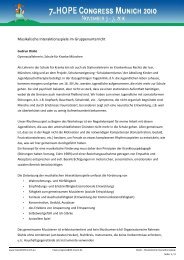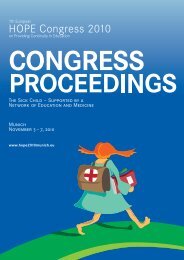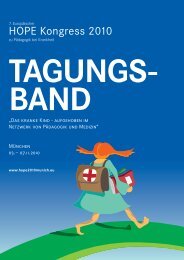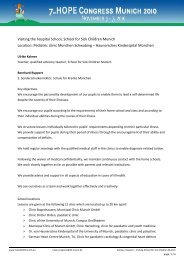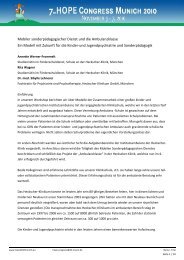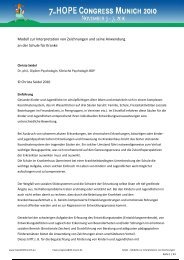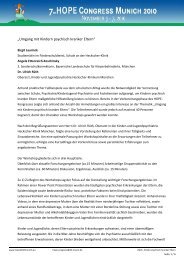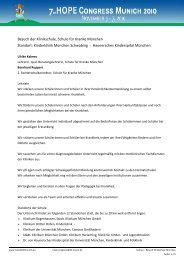HOPE Kongress 2010 - Hope Congress Munich 2010
HOPE Kongress 2010 - Hope Congress Munich 2010
HOPE Kongress 2010 - Hope Congress Munich 2010
Erfolgreiche ePaper selbst erstellen
Machen Sie aus Ihren PDF Publikationen ein blätterbares Flipbook mit unserer einzigartigen Google optimierten e-Paper Software.
88 7th European <strong>HOPE</strong> <strong>Congress</strong> <strong>2010</strong><br />
DSM-V Task force<br />
• Autismus-Spektrum-Störung keine Differenzierung mehr zwischen<br />
Autismus, Asperger<br />
- Syndrom, atypischem Autismus, PDD-NOS<br />
• Soziale Kommunikation & Stereotypes Interesse & Verhalten nicht mehr<br />
drei Verhaltensbereiche<br />
• Separate Schweregradeinschätzungen für beide Bereiche<br />
• ggf. Sprache, Regression, Komorbidität als zusätzliche Codes<br />
Was wirkt wirklich?<br />
• Strukturierte Therapien<br />
– Klar definierte Nahziele, Absprache Eltern<br />
– Soziale Kommunikation<br />
– Eigenständigkeit<br />
– Motivation und Eigeninitiative berücksichtigen<br />
– Generalisierung<br />
• Anpassung im Entwicklungsverlauf<br />
• Behandlung der Begleitsymptome<br />
Lerngang Klinikum<br />
III. Workshops und Foren<br />
Wolfgang Huber<br />
Sonderschulrektor an der Schule für Kranke, Ludwigsburg<br />
Maria Schmidt<br />
Realschullehrerin an der Schule für Kranke, Ludwigsburg<br />
Komitee Mitglied für <strong>HOPE</strong> Sektion Deutschland<br />
Der Lerngang Klinikum wird seit vielen Jahren an der Schule für Kranke<br />
Ludwigsburg ca. 8-mal im Jahr durchgeführt. Zu jedem Termin wird eine<br />
Schulklasse aus dem Einzugsbereich der SfK eingeladen, um einen Tag lang<br />
das Krankenhaus hinter den Kulissen zu erkunden und dabei die Vielfalt der<br />
Berufe im Krankenhaus kennenzulernen (z.B. Laboranten, Telefontechniker,<br />
Haushaltsfachkräfte, IT-Fachleute, Fachpflegekräfte, Elek triker,<br />
Physiotherapeuten, usw.). Die Schüler lernen das Krankenhaus als einen der<br />
großen Arbeitgeber unseres Landkreises kennen, haben die Gelegenheit,<br />
persönlich mit vielen Personen unterschiedlicher Berufe und Tätigkeiten zu<br />
sprechen. Gleichzeitig haben die jungen Leute dabei die Chance, falsche<br />
Vorstellungen zu korrigieren oder mögliche Ängste abzubauen.<br />
Wenn die Schüler morgens ankommen, werden sie in Gruppen zu je vier<br />
aufgeteilt. Jede Gruppe erhält individuelle Wegbeschreibungen, Zeitpläne<br />
und andere Unterlagen. Dann machen sie sich auf den Weg z.B. zur<br />
Notaufnahme, der Neugeborenenstation, der Buchhaltung, der Reparatur-<br />
Werkstatt, den Operationssälen, usw. Bei jeder Anlaufstelle nehmen sie<br />
Kontakt auf zu einer bestimmten Verbindungsperson.<br />
Am Ende des Tages werden in einer gemeinsamen Abschlussrunde<br />
die Erfahrungen und Eindrücke zusammengetragen und den anderen<br />
präsentiert. Eine Vertreterin der Personalabteilung ist anwesend und<br />
beantwortet Fragen nach Schulabschlüssen, Lehrstellen, Berufs laufbahn,<br />
Praktikantenstellen.<br />
Der Tag wird an der Stammschule vor- und nachbereitet, z.B. auch in<br />
Rollenspielen zu Verhalten, Kommunikations- und Präsentations techniken.<br />
Das Projekt kann den folgenden Zielen dienen für die Schüler:<br />
• Abbau von Ängsten in Bezug auf das Krankenhaus;<br />
• Das Krankenhaus hinter den Kulissen kennenlernen;<br />
• Berufserkundung für 14 - 16-jährige Schüler;<br />
• Kontaktaufnahme bezüglich möglicher Praktikantenstellen;<br />
• Einüben von Kommunikations- und Präsentationstechniken;<br />
und für unsere Schule:<br />
• PR für unser Krankenhaus und unsere Schule;<br />
• Stärkung der Kooperation mit den Schulen unseres Einzugsbereichs;<br />
• Vernetzung mit Stationen und Abteilungen in der Klinik.<br />
Project Hospital-School-Home<br />
Collaboration between Monza hospital school and the local<br />
school – Evaluation of a multiyear experience<br />
Flavia Tarquini<br />
Hospital Teacher - Istituto Comprensivo Salvo D’Acquisto<br />
Scuola in Ospedale Monza, ITALY<br />
Angela Passoni<br />
Hospital Teacher - Istituto Comprensivo Salvo D’Acquisto<br />
Scuola in Ospedale Monza, ITALY<br />
Silvia Pertici<br />
Assistente Sociale - Comitato Maria Letizia Verga,<br />
Ospedale San Gerardo, Monza, ITALY<br />
Fondazione Monza Brianza per il Bambino e la sua Mamma<br />
Ospedale San Gerardo Monza, ITALY<br />
One of the main aims of the Hospital School is to help children in hospital<br />
to keep in touch with their own local schools as well as with everyday life.<br />
The Monza hospital school is part of a group of 65 Italian hospitals<br />
included in HSH@Network Project provided by the State Ministry of Edu -<br />
cation. The HSH-Monza project allows children hospitalized in Monza<br />
Pediatric Haematology Unit to collaborate online with some classes of the<br />
local Elisa Sala Junior High School in order to develop multidisciplinary<br />
projects by videoconference.<br />
Since 2001/2002, Junior High School students taking part to the project<br />
have been requested to fill in a form to evaluate teaching objectives and<br />
the emotional impact of the experience.<br />
The aim of our contribution is to present the evaluation method and the<br />
results of a multiyear monitoring and to reflect on the deep meaning of the<br />
collaboration between the local territory and the hospital.<br />
Evaluation method<br />
• The evaluation has been carried out by giving Junior High School<br />
students open answers questionnaries about previous knowledge of<br />
the hospital school, evaluation of the use of the project: didactic and<br />
educational value, personal feelings about the participation<br />
• The data have been analysed and discussed by the operators to test and<br />
redefine the project<br />
Results<br />
According to the answers given by the Junior High School students, the<br />
videoconference has proved very useful to get a better knowledge of the<br />
hospital school.<br />
The experience of collaboration with the hospital school children has been<br />
considered a very positive one, both for its educational aspect and for its<br />
relational impact.<br />
Conclusions<br />
Junior High School students, while just sitting at their own school desks,<br />
have been offered the opportunity to enter the hospital classroom, to<br />
learn something about the everyday life in hospital, to get in touch with<br />
ill children and teenagers, to cooperate and to work in a condition of<br />
equality, overcoming together difficulties and fears. The project has been<br />
an important occasion to test how a situation of difficulty can become<br />
an opportunity of integration and growth for the participants. When the<br />
hospitalized students are ready to go back to their local schools, the<br />
products made together not only represent their individual’s experience,<br />
but also a concrete contribution to share with other people.<br />
Parents as Partners<br />
Tanja Becan<br />
Headteacher Ledina Hospital School, Ljubljana, SLOVENIA<br />
We’ll focus on<br />
• the need for cooperation between the parents and teachers,<br />
• the prospects for successful cooperation between the parents and<br />
teachers,



